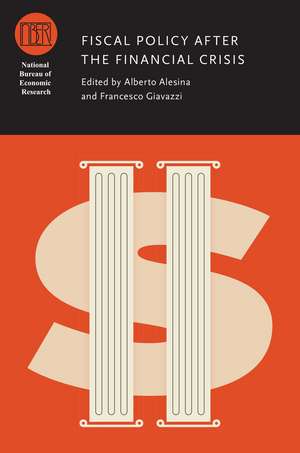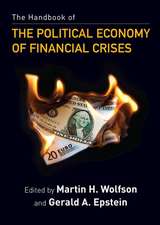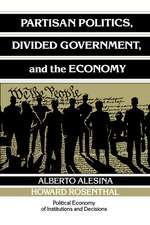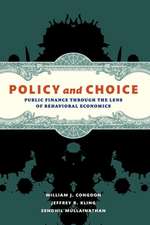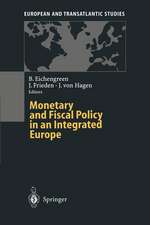Fiscal Policy after the Financial Crisis: National Bureau of Economic Research Conference Report
Editat de Alberto Alesina, Francesco Giavazzien Limba Engleză Hardback – 8 iul 2013
The
recent
recession
has
brought
fiscal
policy
back
to
the
forefront,
with
economists
and
policy
makers
struggling
to
reach
a
consensus
on
highly
political
issues
like
tax
rates
and
government
spending.
At
the
heart
of
the
debate
are
fiscal
multipliers,
whose
size
and
sensitivity
determine
the
power
of
such
policies
to
influence
economic
growth.
Fiscal Policy after the Financial Crisisfocuses on the effects of fiscal stimuli and increased government spending, with contributions that consider the measurement of the multiplier effect and its size. In the face of uncertainty over the sustainability of recent economic policies, further contributions to this volume discuss the merits of alternate means of debt reduction through decreased government spending or increased taxes. A final section examines how the short-term political forces driving fiscal policy might be balanced with aspects of the long-term planning governing monetary policy.
Fiscal Policy after the Financial Crisisfocuses on the effects of fiscal stimuli and increased government spending, with contributions that consider the measurement of the multiplier effect and its size. In the face of uncertainty over the sustainability of recent economic policies, further contributions to this volume discuss the merits of alternate means of debt reduction through decreased government spending or increased taxes. A final section examines how the short-term political forces driving fiscal policy might be balanced with aspects of the long-term planning governing monetary policy.
A
direct
intervention
in
timely
debates,Fiscal
Policy
after
the
Financial
Crisisoffers
invaluable
insights
about
various
responses
to
the
recent
financial
crisis.
Din seria National Bureau of Economic Research Conference Report
- 8%
 Preț: 536.74 lei
Preț: 536.74 lei - 5%
 Preț: 900.97 lei
Preț: 900.97 lei - 27%
 Preț: 751.40 lei
Preț: 751.40 lei - 9%
 Preț: 751.95 lei
Preț: 751.95 lei - 8%
 Preț: 535.23 lei
Preț: 535.23 lei - 9%
 Preț: 661.72 lei
Preț: 661.72 lei - 9%
 Preț: 777.88 lei
Preț: 777.88 lei - 9%
 Preț: 754.96 lei
Preț: 754.96 lei - 20%
 Preț: 737.44 lei
Preț: 737.44 lei -
 Preț: 350.32 lei
Preț: 350.32 lei - 27%
 Preț: 779.96 lei
Preț: 779.96 lei -
 Preț: 275.19 lei
Preț: 275.19 lei -
 Preț: 396.85 lei
Preț: 396.85 lei - 23%
 Preț: 672.20 lei
Preț: 672.20 lei - 23%
 Preț: 451.31 lei
Preț: 451.31 lei -
 Preț: 367.59 lei
Preț: 367.59 lei - 23%
 Preț: 598.34 lei
Preț: 598.34 lei - 23%
 Preț: 638.56 lei
Preț: 638.56 lei - 27%
 Preț: 715.19 lei
Preț: 715.19 lei - 23%
 Preț: 591.59 lei
Preț: 591.59 lei - 27%
 Preț: 757.96 lei
Preț: 757.96 lei - 23%
 Preț: 623.75 lei
Preț: 623.75 lei - 23%
 Preț: 556.65 lei
Preț: 556.65 lei - 27%
 Preț: 872.19 lei
Preț: 872.19 lei - 23%
 Preț: 616.34 lei
Preț: 616.34 lei - 27%
 Preț: 762.17 lei
Preț: 762.17 lei - 27%
 Preț: 802.94 lei
Preț: 802.94 lei - 27%
 Preț: 813.21 lei
Preț: 813.21 lei -
 Preț: 384.89 lei
Preț: 384.89 lei - 23%
 Preț: 454.11 lei
Preț: 454.11 lei - 27%
 Preț: 762.17 lei
Preț: 762.17 lei -
 Preț: 486.42 lei
Preț: 486.42 lei -
 Preț: 391.85 lei
Preț: 391.85 lei - 23%
 Preț: 629.08 lei
Preț: 629.08 lei - 20%
 Preț: 430.84 lei
Preț: 430.84 lei - 20%
 Preț: 368.22 lei
Preț: 368.22 lei - 22%
 Preț: 624.68 lei
Preț: 624.68 lei - 21%
 Preț: 424.17 lei
Preț: 424.17 lei - 15%
 Preț: 214.21 lei
Preț: 214.21 lei - 22%
 Preț: 614.43 lei
Preț: 614.43 lei - 20%
 Preț: 466.06 lei
Preț: 466.06 lei - 22%
 Preț: 552.54 lei
Preț: 552.54 lei - 15%
 Preț: 244.53 lei
Preț: 244.53 lei - 20%
 Preț: 494.56 lei
Preț: 494.56 lei - 21%
 Preț: 488.86 lei
Preț: 488.86 lei - 11%
 Preț: 301.72 lei
Preț: 301.72 lei - 21%
 Preț: 464.96 lei
Preț: 464.96 lei - 21%
 Preț: 378.58 lei
Preț: 378.58 lei
Preț: 717.44 lei
Preț vechi: 982.80 lei
-27% Nou
Puncte Express: 1076
Preț estimativ în valută:
137.28€ • 143.33$ • 113.62£
137.28€ • 143.33$ • 113.62£
Carte tipărită la comandă
Livrare economică 04-18 aprilie
Preluare comenzi: 021 569.72.76
Specificații
ISBN-13: 9780226018447
ISBN-10: 022601844X
Pagini: 704
Ilustrații: 30 halftones, 108 line drawings, 120 tables
Dimensiuni: 152 x 229 x 43 mm
Greutate: 0.95 kg
Ediția:New.
Editura: University of Chicago Press
Colecția University of Chicago Press
Seria National Bureau of Economic Research Conference Report
ISBN-10: 022601844X
Pagini: 704
Ilustrații: 30 halftones, 108 line drawings, 120 tables
Dimensiuni: 152 x 229 x 43 mm
Greutate: 0.95 kg
Ediția:New.
Editura: University of Chicago Press
Colecția University of Chicago Press
Seria National Bureau of Economic Research Conference Report
Notă biografică
Alberto Alesina is the Nathaniel Ropes Professor of Political Economy at Harvard University, and a research associate and director of the Political Economy Program at the NBER. Francesco Giavazzi is professor of economics at Bocconi University, Italy, and visiting professor of economics at the Massachusetts Institute of Technology. He is a research associate of the NBER.
Cuprins
Acknowledgments
Introduction
Alberto Alesina and Francesco Giavazzi
Introduction
Alberto Alesina and Francesco Giavazzi
1. Government Spending and Private Activity
Valerie A. Ramey
Comment: Roberto Perotti
2. Fiscal Multipliers in Recession and Expansion
Alan J. Auerbach and Yuriy Gorodnichenko
Comment: Robert E. Hall
3. The Household Effects of Government Spending
Francesco Giavazzi and Michael McMahon
Comment: Lawrence J. Christiano
4. The Role of Growth Slowdowns and Forecast Errors in Public Debt Crises
William Easterly
Comment: Indira Rajaraman
5. Game Over: Simulating Unsustainable Fiscal Policy
Richard W. Evans, Laurence J. Kotlikoff, and Kerk L. Phillips
Comment: Douglas W. Elmendorf
6. How Do Laffer Curves Differ across Countries?
Mathias Trabandt and Harald Uhlig
Comment: Jaume Ventura
7. Perceptions and Misperceptions of Fiscal Inflation
Eric M. Leeper and Todd B. Walker
Comment: Jordi Galí
8. The “Austerity Myth”: Gain without Pain?
Roberto Perotti
Comment: Philip R. Lane
9. Can Public Sector Wage Bills Be Reduced?
Pierre Cahuc and Stephane Carcillo
Comment: Paolo Pinotti
10. Entitlement Reforms in Europe: Policy Mixes in the Current Pension Reform Process
Axel H. Börsch-Supan
Comment: David A. Wise
Axel H. Börsch-Supan
Comment: David A. Wise
11. “Fiscal Devaluation” and Fiscal Consolidation: The VAT in Troubled Times
Ruud de Mooij and Michael Keen
Comment: James M. Poterba
Ruud de Mooij and Michael Keen
Comment: James M. Poterba
12. Fiscal Rules: Theoretical Issues and Historical Experiences
Charles Wyplosz
Comment: Lucio R. Pench
Charles Wyplosz
Comment: Lucio R. Pench
13. The Electoral Consequences of Large Fiscal Adjustments
Alberto Alesina, Dorian Carloni, and Giampaolo Lecce
Comment: Thomas Romer
Alberto Alesina, Dorian Carloni, and Giampaolo Lecce
Comment: Thomas Romer
Contributors
Author Index
Subject Index
Recenzii
“The
financial
crisis
illuminated
gaps
in
economists’
understanding
of
both
fiscal
and
monetary
policy.
This
work,
a
National
Bureau
of
Economic
Research
conference
report,
addresses
fiscal
policy
gaps.
.
.
.
The
articles,
particularly
William
Easterly’s
article
on
governments’
inability
to
adjust
current
spending
to
a
new,
slower
growth
path
provide
a
valuable
discussion
of
many
key
issues
facing
policy
makers
today.
Recommended.”
Descriere
The recent recession has brought fiscal policy back to the forefront, with economists and policy makers struggling to reach a consensus on highly political issues like tax rates and government spending. At the heart of the debate are fiscal multipliers, whose size and sensitivity determine the power of such policies to influence economic growth.
Fiscal Policy after the Financial Crisis focuses on the effects of fiscal stimuli and increased government spending, with contributions that consider the measurement of the multiplier effect and its size. In the face of uncertainty over the sustainability of recent economic policies, further contributions to this volume discuss the merits of alternate means of debt reduction through decreased government spending or increased taxes. A final section examines how the short-term political forces driving fiscal policy might be balanced with aspects of the long-term planning governing monetary policy.
Fiscal Policy after the Financial Crisis focuses on the effects of fiscal stimuli and increased government spending, with contributions that consider the measurement of the multiplier effect and its size. In the face of uncertainty over the sustainability of recent economic policies, further contributions to this volume discuss the merits of alternate means of debt reduction through decreased government spending or increased taxes. A final section examines how the short-term political forces driving fiscal policy might be balanced with aspects of the long-term planning governing monetary policy.
A direct intervention in timely debates, Fiscal Policy after the Financial Crisis offers invaluable insights about various responses to the recent financial crisis.
